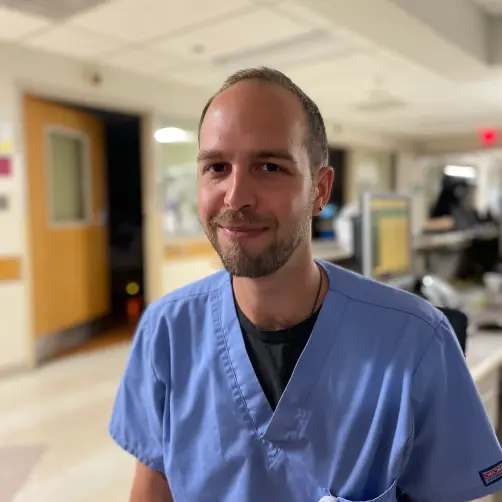
Table of Contents
What You Should Know About the Mental Health Continuum of Care

Written By: Ethan Cohen BSN, RN

Clinically Reviewed By: Dr. Don Gasparini
Updated: January 30, 2024
5 min.
Mental healthcare is not one-size-fits-all. Learn more about the full range of mental health treatment options and services people may need here.
Learn more about our Clinical Review Process
Table of Contents
More than one in five people in the United States is dealing with a mental health condition, but getting mental health support is not one-size-fits-all. That’s why there are a range of mental health treatment options and services, known collectively as the mental health continuum of care.
Just like physical healthcare spans from primary care to emergency surgery, the mental health continuum model encompasses everything from once-weekly therapy and other outpatient care options to hospitalization or residential care. Offering a continuum of care so that people get the right care for their needs promotes overall well-being and better mental health outcomes. Below, we delve into the different care options included in the mental health continuum of care.

Do you need a little extra mental health support?
Charlie Health offers more than once-weekly therapy with others who get it.
Care options within the mental health continuum of care
The mental health continuum of care consists of different kinds of support meant to help people at various stages of their mental health journey. Treatment ranges from once-weekly counseling to more intensive ongoing options to crisis intervention services. These levels work together to ensure comprehensive care for mental health needs. Here are some common care options in the mental health continuum of care.
Psychotherapy or traditional outpatient therapy
Intensive outpatient treatment
Partial hospitalization program
Residential treatment
Inpatient treatment
Consistent meetings with a licensed mental health professional to explore thoughts and feelings and learn coping strategies.
More than once-weekly therapy sessions for people who need extra support managing their mental health.
Day-long therapy sessions for people who need more intensive support.
Place-based, 24/7 care for people who need round-the-clock support.
Short term acute care to address mental health crises.
Psychotherapy or traditional outpatient therapy
Psychotherapy, often referred to as “talk therapy” or traditional outpatient therapy, is a collaborative process between a therapist and client aimed at addressing emotional, mental, and behavioral challenges. This type of engagement is considered the lowest level on the continuum of care and is often used for less severe mental, behavioral, and social problems.
Commonly, people meet with a licensed mental health professional on a weekly, bi-weekly, or monthly basis to explore their thoughts, feelings, and behaviors in a safe and confidential environment. Through various therapeutic techniques and interventions, including cognitive-behavioral therapy (CBT), dialectical behavior therapy (DBT), or psychodynamic therapy, people gain insight into their experiences, learn coping strategies, and develop skills to manage symptoms effectively.
Psychotherapy can be short-term or long-term; one foundational study found that half of psychotherapy patients showed improvement after eight sessions, and 75% improved after six months.
Intensive outpatient treatment
As its name suggests, intensive outpatient treatment, usually administered in an intensive outpatient program (IOP), offers more mental health support than once-weekly therapy. Unlike traditional talk therapy, an IOP typically includes multiple therapeutic sessions per week for several hours at a time, allowing for more frequent engagement and support. Also, it typically combines individual sessions with group sessions and family sessions.
People may choose an IOP over traditional talk therapy when they are experiencing moderate to severe mental health symptoms and require more frequent and structured therapeutic support. This level of care may also help people who have completed a higher level of care, such as inpatient treatment and need a step-down option before returning to independent living.
The duration of an IOP program varies based on individual needs and treatment goals. However, research suggests that significant improvements can be achieved within several weeks of consistent attendance and more consistent attendance is correlated with better results.
Partial hospitalization program (PHP)
A partial hospitalization program (PHP) offers a structured and intensive level of care for people with significant mental health needs who do not require round-the-clock supervision in an inpatient setting. Like an IOP, a PHP often includes a combination of therapy sessions, group counseling, medication management, and psychoeducation (where people learn about mental health conditions). However, a PHP is more time-intensive. Participants typically attend the program for most hours of the day, allowing for comprehensive treatment while still maintaining some level of independence and involvement in their daily lives.

Residential treatment
At this level of care, people live in a place where they are provided 24/7 care. These residential facilities offer a group therapeutic environment where people receive ongoing treatment, support, and supervision while living alongside other community members. Residential care programs often include therapy sessions, medication management, life skills training, and recreational activities to support community members in their recovery journey.
This level of care is for people who need monitoring and support at all times to ensure their safety, including those struggling with suicidality, substance use disorder (SUD), and more. It is a longer-term care option for people with chronic mental health conditions or complex needs. The length of stay in residential care can vary widely, ranging from several weeks to several months or even longer, depending on the individual’s progress and treatment goals.
Inpatient treatment
Inpatient care, often referred to as acute psychiatric care, involves admission to a hospital emergency department or psychiatric facility for intensive psychiatric treatment and monitoring. It is typically reserved for people experiencing severe mental health crises or acute symptoms that require immediate intervention and round-the-clock supervision. Inpatient care focuses on stabilization, crisis management, and short-term treatment to address acute symptoms.
While both inpatient and residential care involve living on-site at a treatment facility, they differ in terms of the level of intensity and duration of treatment. Inpatient care is focused on acute stabilization and crisis management, whereas residential care provides a longer-term supportive environment.
However, in the mental health continuum model, people often transition between these levels of care. For instance, someone may initially receive psychiatric treatment at an emergency department and then transition to residential care for ongoing mental health support.

How Charlie Health can help
If you or a young person in your life is struggling with a mental health disorder, Charlie Health is here to help. Charlie Health offers a virtual Intensive Outpatient Program (IOP), which provides more than once weekly support for teens and adults with serious mental health conditions, including anxiety, depression, co-occurring substance use disorder, and more. Our expert clinicians incorporate evidence-based therapies into individual counseling, family therapy, and group sessions. With this kind of holistic treatment, managing mental illness is possible. Fill out the form below or give us a call to start healing today.




